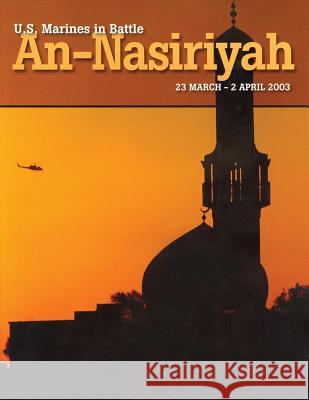U.S. Marines in Battle: An-Nasiriyah, 23 March - 2 April 2003 » książka
U.S. Marines in Battle: An-Nasiriyah, 23 March - 2 April 2003
ISBN-13: 9781500235642 / Angielski / Miękka / 2014 / 52 str.
On 23 March 2003, 5,800 U.S. Marines and U.S. Navy Corpsmen-the warriors of Task Force Tarawa-began fighting a ferocious battle in the city of an-Nasiriyah, Iraq. As the first large-scale battle fought by U.S. Marines in Operation Iraqi Freedom, Nasiriyah became a test of the Coalition's ability and resolve to defeat a determined, resourceful foe that relied on a combination of conventional units and tactics and irregular forces willing to violate the laws of war. Task Force Tarawa's Marines adapted quickly, and the battle of Nasiriyah, with its asymmetrical warfare, emphasis on combined arms and joint operations, and Coalition forces' ability to react quickly and aggressively against unexpected enemy tactics became emblematic of the 2003 Operation Iraqi Freedom campaign. Nasiriyah lies in a date-growing region along the banks of the Euphrates River in Dhi Qar Province about 225 miles southeast of Baghdad. Its population, made up almost entirely of Shi'a Muslims, was an estimated 560,000 in 2003, making it the fourth most populous city in the country. It was founded in 1840 near the ruins of the ancient city of Ur, the birthplace of Abraham. The events that brought the Marines to Nasiriyah, however, were far more current. Only six days before they stormed into the city, President George W Bush had issued an ultimatum giving Iraqi President Saddam Hussein and his two sons 48 hours to leave Iraq. The United States had viewed the Iraqi government with heightened concern since the terrorist attacks of 11 September 2001. Hussein's regime was believed to sponsor global terrorism and also to be building and stockpiling weapons of mass destruction -nuclear, chemical, and biological weapons for use against its neighbors and Western nations. Soon after 11 September, it became clear that the immediate source of the terrorist who carried out those attacks was Afghanistan rather than Iraq. Even during the offensive against the Taliban in Afghanistan, however, the Bush administration anticipated the need to topple Hussein's regime, leading the U.S. military to start planning for a possible invasion of Iraq. Hussein had ignored or violated 16 United Nations resolutions, many of them requiring him to disclose what had become of the mass destruction weapons his country had once possessed. and to allow international inspectors to search for them or verify their destruction. In light of Hussein's intransigence, the Bush administration concluded, as did many experts around the world, that Iraq still harbored those weapons, and with aggressive intent.
Zawartość książki może nie spełniać oczekiwań – reklamacje nie obejmują treści, która mogła nie być redakcyjnie ani merytorycznie opracowana.











